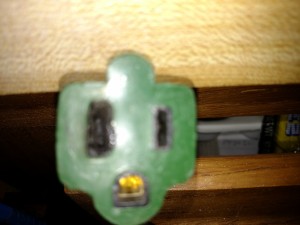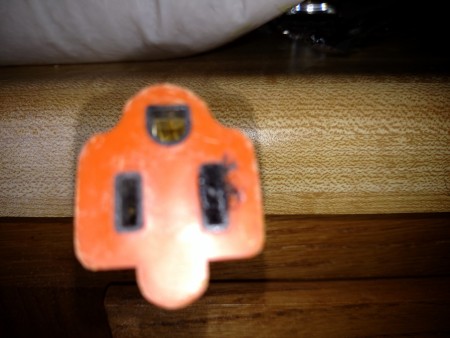 Why would a 2 prong yard tool connected to a 3 prong extension cord cause the large prong insert to overheat and begin to burn within a few minutes of use? This happened to two different yard tools on separate occasions and the only occasions which I used tools. Thank you.
Why would a 2 prong yard tool connected to a 3 prong extension cord cause the large prong insert to overheat and begin to burn within a few minutes of use? This happened to two different yard tools on separate occasions and the only occasions which I used tools. Thank you.

Add your voice! Click below to answer. ThriftyFun is powered by your wisdom!
First:
Using a 2-prong tool plugged into a 3-prong extension cord is a safety hazard and should never be done.
There are many reasons why this is not safe but the main reason is that your 2-prong tool will not be grounded and could cause a fire or cause an electric shock to a person.
"Extension cords can overheat and cause fires when used improperly. Overheating is usually caused by overloading or connecting appliances that consume more watts than the cord can handle. Damaged extension cords can also cause fires."
If the power strip or extension cord feels hot, that is a sign that it is overloaded and may start a fire.
Your yard tool was most likely causing an overload to the extension cord. In other words, the extension cord was most likely not the proper grade needed to power your tool.
In other words, your yard tool needs more power than your extension card can deliver and your extension cord can and will burn up or even catch on fire.
Although a higher grade of extension cord may not get hot or burn the plug but it is still not safe for use with a 2-prong tool.
Whatever tools you have that are 2-prong must be older tools as the 2-prong has not been used for many years.
Some people might say you can use an 'adapter' that will let you plug a 2-prong into a 3-prong but that is not always safe and it is intended to be used with a wall plug so it can be grounded and NOT used with an extension cord.
Check some of these sites for clearer information:
This is a link to a PDF file:
www.google.com/
Both 2-prong and 3-prong sockets are two phase. The third (lower) prong is connected to a ground (very large piece of metal, usually a plumbing pipe, deep in the real ground). The 2-prong plug does not get the grounding benefit of the third prong. When you plug a 2-prong device into a 3-prong extension cord, the device is not connected in any way to the ground wire in the cord. There is no downside in this arrangement, but a 2 wire / prong extension would do the same thing. There are older 2-prong devices that do not have adequate grounding and pose some risk if the device is damaged during use, for example some older metal bodied electric drills. Unfortunately, using a 3 wire extension will offer no greater protection when used with a 2-prong appliance. If the 2-prong device is fairly modern, it is sufficiently insulated in its design so that it does not need a separate grounding line (these devices were often referred to as double insulated). It means that the designer has ensured that it is highly unlikely that a consumer can come in contact with a hot lead in the device.
Overheat can be caused by the electrical device itself, the electrical outlet or the extension cord. If the plug of the same device (yard tool) was not hot before then your outlet or extension cord could be faulty and yes it is a hazard. It will gradually deteriorate and create sparks to start a fire. Verify your yard tools by moving them to another outlet. If it is still hot then your yard tool is faulty. Then verify the extension cord with other device. If you connected other devices to the same extension cord and there was no such overheat, then the problem is not in the extension cord itself, but in its insufficient power. Most likely you are using yard tools that are too powerful for this extension cord.
When using extension cords, follow the following rules:
Purchase only cords that have been approved by an independent testing laboratory.
Never use indoor extension cords outdoors. For outdoor projects, use only extension cords marked for outdoor use.
This happens when the extension cord isn't heavy duty enough for the power the tool requires. You need a heavier duty extension cord and a three-prong adapter plug. That should solve the problem.
Good luck.
Add your voice! Click below to answer. ThriftyFun is powered by your wisdom!